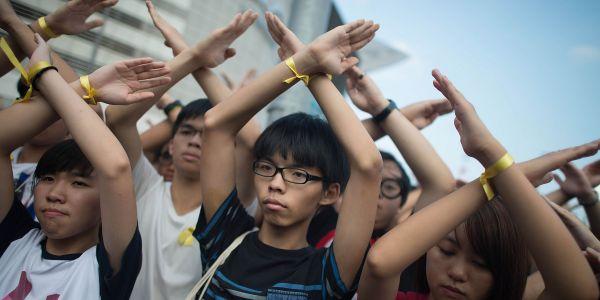As my colleague Colin Wolfgang likes to say, “protests are so IN right now.” The latest country to experience mass pro-democracy protests
is also perhaps the most surprising: in China over the last two weeks, student
groups and pro-democracy activists have joined forces in Hong Kong to stage
huge demonstrations and sit-ins. Despite a total government blackout on
information leaving Hong Kong, reports and photos are still coming out showing
that the protests have spread throughout the central area of the city, and show
no signs of abating.
The protests taking place in Hong Kong are primarily due to a
declaration in August that Beijing would reserve the right to vet all
candidates for the chief executive of the autonomously administrated city. The vetting process will take place in the first direct elections for the position, due to take place in 2017. When
Hong Kong gained independence from the U.K. in 1997, part of the agreement for
its transfer to Chinese administration was autonomous rule for 50 years, and
direct elections for the chief executive in 20.
The elections would have provided the first enclave of
democracy within China’s autocratic system. The decision that the central
government would take control of the democratic process by only allowing
candidates that it has approved to run would negate this move towards democracy.
While the decision was made by the central government at the time of Hong
Kong’s transfer, the issue has reappeared in public discourse as the
elections draw nearer.
The protest movement began over the summer, when
pro-democracy groups held an unofficial referendum in June on the subject of
universal suffrage to vote for chief executive candidates. Styling itself after
the “Occupy Wall Street” movement, Occupy Central was the main pro-democracy
group that organized the referendum, although there are many groups involved in
the protest and referendum movement as a whole. The June referendum led to
Beijing’s announcement that the referendum held no legal standing, and that the
government would vet all candidates as previously planned.
Over the past few months, demonstrations against the decision to
ignore the referendum have gained steam, and in September student groups staged
a boycott of classes in protest. The student groups now appear to have joined
forces with Occupy Central and other pro-democracy groups, leading to the
massive protests seen in the last two weeks. Opposition protestors have
scuffled with the pro-democracy camp over the last two days, and some allege
that the opposition is made up of government thugs and “imported” protestors
from the mainland.
Although due to meet with representatives from Hong Kong’s
administration today, including the chief executive's second-in-command, pro-democracy leaders have postponed the talks due to the
government’s failure to protect the protestors from attacks, allegedly at the
hands of the Beijing-funded mafia. Whether or not outsiders are being brought
in to increase the numbers of the opposition, however, there are Hong Kong
residents also within the opposition’s ranks, many of whom are frustrated with
the disruptions to daily life in the city and want the protest movement to
switch tactics. As Kang Yi, an Professor at Hong Kong Baptist University, put
it to Foreign Policy magazine:
“[The Chinese government in Beijing] are all aware that the longer this protest
drags on and the more disruption and inconvenience it is perceived to have
caused to local businesses and citizens, the more likely other Hong Kongers
will backlash against the students and this whole movement.”
While connections are already being drawn to the
pro-democracy movements of the Arab Spring, those hopeful for a democratic revolution in China should not hold their breath. The protests have
yet to spread in any significant way outside of Hong Kong (and why should they,
when the issue at hand is a Hong Kong-specific problem), and the government’s
security and information apparatuses are well prepared to handle even massive
protest movements. Hong Kong also is no stranger to protests against Beijing's rule: in 2012, hundreds of thousands of HK residents took to the street to protest a visit by Chinese premier Hu Jin Tao. Just this year in March, thousands protested the brutal attack of a journalist, allegedly on Beijing's orders. China's "one country, two systems" policy has ensured that while peaceful protests can take place in Hong Kong, they would be unthinkably dangerous in all other areas of the country.
While there is still hope that Hong Kong may gain important
democratic privileges such as universal suffrage to nominate and elect its
leader, it is extremely unlikely that the government in Beijing would extend
these rights anywhere outside of the Hong Kong area. Unfortunately for those hoping for a democratic China, the Chinese government has created a much more stable system of autocracy than erstwhile dictators like Gaddafi, Mubarak, and Ben-Ali. To bring it down, pro-democracy activists will need much more than a protest movement in a single city, but Hong Kong is as good a place as any to start.

The debate is still out as to whether or not democracy is the best way to govern in today's society. A government cannot be all things to all people. China has accomplished quite a bit under their current system of rule, although at the expense of human rights. Unfortunately for these protesters it seems that they are the minority as the people of Hong Kong have become annoyed with their persistence. Singapore is licking its chops right now at the prospect of Hong Kong losing stability and thus relinquishing its status as Asia's center of finance. If that happens HK will be nothing.
ReplyDelete